 Myounghoon “Philart” Jeon (CLS/CS) published “Towards affect-integrated driving behaviour research” in Theoretical Issues in Ergonomics Science.
Myounghoon “Philart” Jeon (CLS/CS) published “Towards affect-integrated driving behaviour research” in Theoretical Issues in Ergonomics Science.
DOI:10.1080/1463922X.2015.1067934
 Myounghoon “Philart” Jeon (CLS/CS) published “Towards affect-integrated driving behaviour research” in Theoretical Issues in Ergonomics Science.
Myounghoon “Philart” Jeon (CLS/CS) published “Towards affect-integrated driving behaviour research” in Theoretical Issues in Ergonomics Science.
DOI:10.1080/1463922X.2015.1067934
HOUGHTON — Since Monday, these 9 middle and high school science teachers have been learning how to use energy productively and efficiently at the Designing A Sustainable Future Teacher’s Institute.
“Well everyday we’ve had different themes,” says local science teacher Heather Bradway. “Monday was solar, today we’re going to learn about sustainable food systems. So it covers many different aspects,” says Bradway.
Read more and watch the video at Upper Michigan’s Source, by Aleah Hordges.
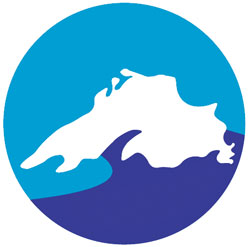 The beauty and bounty of Lake Superior will be celebrated Sunday at the Third Annual Lake Superior Day in Copper Harbor. Community volunteers, along with the Lake Superior Stewardship Initiative, are organizing the festival with lots of special activities at the 6th Street Dock along the Copper Harbor Boardwalk. Activities include:
The beauty and bounty of Lake Superior will be celebrated Sunday at the Third Annual Lake Superior Day in Copper Harbor. Community volunteers, along with the Lake Superior Stewardship Initiative, are organizing the festival with lots of special activities at the 6th Street Dock along the Copper Harbor Boardwalk. Activities include:
From 1-4 p.m. a special highlight is the opportunity for festival attendees to find out how scientists study the Great Lakes by taking a 40-minute scientific excursion aboard Michigan Tech’s research vessel, Agassiz. The excursions are part of the Ride the Waves Program funded by a grant from General Motors. The Agassiz will depart every 45 minutes from the Isle Royale Queen dock beginning at 1 p.m. Participants must be at least seven years old, and children must be accompanied by an adult. All participants should wear closed-toe shoes. Space is limited and those interested may pre-register by calling 7-3341 or email Lloyd Wescoat at lwescoat@mtu.edu. Lake Superior Day is celebrated throughout the Lake Superior basin on or close to the third Sunday in July in many communities around Lake Superior. Learn more about Lake Superior Day events around the lake.
From Tech Today, by Joan Chadde.
Copper Harbor to celebrate 2015 Lake Superior Day with fun for all July 26
COPPER HARBOR — Celebrate Lake Superior Day in Copper Harbor from 1 p.m. to 4 p.m. on Sunday, July 26, 2015. Celebrate the beauty and bounty of Lake Superior! Copper Harbor community volunteers, along with the Lake Superior Stewardship Initiative, are organizing the 3rd annual Lake Superior Day Festival with lots of special activities at the 6th Street Dock along the Copper Harbor Boardwalk (near Isle Royale Queen boat dock).
People celebrate Lake Superior Day
COPPER HARBOR – Some people were listening to science talks. Some were paddling in canoes. Others were simply eating grilled corn and looking out over the water.
Read more at the Mining Gazette, by Garrett Neese (subscription required).
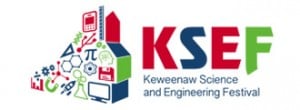 The Michigan Tech Center for Science & Environmental Outreach will conduct a family engineering event from noon-3 p.m. August 6 at Houghton’s Kestner Waterfront Park. The event is part of the Keweenaw Science and Engineering Festival. A total of 15 volunteers are needed to help. No prior experience is necessary It is hands on and will be fun for all ages, but targets elementary students and their parents. However, many of the engineering challenges work for middle/high school ages and beyond.
The Michigan Tech Center for Science & Environmental Outreach will conduct a family engineering event from noon-3 p.m. August 6 at Houghton’s Kestner Waterfront Park. The event is part of the Keweenaw Science and Engineering Festival. A total of 15 volunteers are needed to help. No prior experience is necessary It is hands on and will be fun for all ages, but targets elementary students and their parents. However, many of the engineering challenges work for middle/high school ages and beyond.
The volunteers will monitor and encourage participants in ten to 12 short, self-directed activities of three to five minutes each. Also needed are one or two volunteers for each of the engineering challenges, about four or five. A 40 by 60-foot tent will be set up for the activities.
An optional practice session will be held at the Great Lakes Research Center the day before the family event. To sign up, email your name, cell phone number and academic major or department to jchadde@mtu.edu. Learn more about the Keweenaw Science and Engineering Festival.
From Tech Today, by Joan Chadde.
Sun, sand, science
Festival intended to spark STEM interest
Read more at the Mining Gazette, by Meghan Marquardt (subscription required).
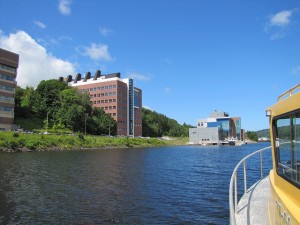 “How scientists assess the health of Lake Superior” is the focus of free scientific excursions that will be offered at the Chassell Strawberry Festival from 1-5 p.m., Saturday departing from the marina.
“How scientists assess the health of Lake Superior” is the focus of free scientific excursions that will be offered at the Chassell Strawberry Festival from 1-5 p.m., Saturday departing from the marina.
The public is invited to sign up for free scientific excursions aboard Michigan Tech’s research vessel Agassiz by calling the Center for Science, Math & Environmental Education at 7-3341 or coming to the Chassell Marina dock on Saturday between 12:30 and 4 p.m. Spaces go quickly. On-site sign-ups begin at 12:30 p.m. with first departure at 1 pm. Half of spaces will be saved for onsite participants.
On each scientific excursion, Martin Auer (CEE) will demonstrate the use of sampling equipment to collect plankton and sediment, evaluate water clarity, temperature and turbidity that tell us about the health of the lake, i.e. Chassell Bay. Participants will investigate the connection between land uses and the health of the Great Lakes.
Scientific excursions will depart from the Chassell marina dock approximately every half hour. Space is limited to 15 persons per excursion (children must be at least 7 years of age and accompanied by an adult). Life jackets are available for all passengers.
Remotely-Operated-Vehicle (ROV) demonstrations will also be conducted from the Chassell Marina dock throughout the afternoon. “Copper Country residents and visitors are encouraged to learn how scientists study the Great Lakes and what factors contribute to a healthy lake,” explains Joan Chadde, education program director. “These scientific excursions for the public have been offered at the Strawberry Festival since 2006 and have been extremely popular. Youth and adults enjoy the opportunity to interact with Great Lakes scientists and get their questions answered.”
The event is coordinated by the Western U.P. Center for Science, Mathematics and Environmental Education and Michigan Tech’s Great Lakes Research Center. This year, the program is funded by the GM Ride the Waves Program putting more than 500 Copper Country youth and adults on the water each year to learn about the Great Lakes and promote STEM careers, along with support from the Michigan Tech Center for Water & Society and the Chassell Lions Club.
 Myounghoon “Philart” Jeon (CLS/CS) and colleagues presented four research projects at the International Conference on Auditory Display (ICAD) in Graz, Austria: “Regulating drivers’ aggressiveness by sonifying emotional data,” “Subjective assessment of in-vehicle auditory warnings for rail grade crossings,” “Exploration of semiotics of new auditory displays: A comparative analysis with visual displays,” and “Cultural differences in preference of auditory emoticons: USA and South Korea.” Jeon also successfully hosted the workshop on “In-vehicle Auditory Interactions” at ICAD. This workshop was partly supported by MTTI.
Myounghoon “Philart” Jeon (CLS/CS) and colleagues presented four research projects at the International Conference on Auditory Display (ICAD) in Graz, Austria: “Regulating drivers’ aggressiveness by sonifying emotional data,” “Subjective assessment of in-vehicle auditory warnings for rail grade crossings,” “Exploration of semiotics of new auditory displays: A comparative analysis with visual displays,” and “Cultural differences in preference of auditory emoticons: USA and South Korea.” Jeon also successfully hosted the workshop on “In-vehicle Auditory Interactions” at ICAD. This workshop was partly supported by MTTI.
Steven Landry’s (CLS, Advisor: Myounghoon Philart Jeon) research proposal, “Affective Interactive Dancer Sonification” has been selected for the Doctoral Colloquium, “Think Tank“, at the 21st International Conference on Auditory Display (ICAD). Landry will receive a travel and registration grant from the National Science Foundation.
ICAD 2015 – ICAD in Space: Interactive Spatial Sonification was held July 8-10.
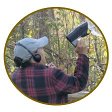 14 middle and high school teachers from across Michigan are on the Michigan Tech campus this week as part of the five-day “Engaging Students in Authentic Science Research Teacher Institute,” running through Friday.
14 middle and high school teachers from across Michigan are on the Michigan Tech campus this week as part of the five-day “Engaging Students in Authentic Science Research Teacher Institute,” running through Friday.
The institute is designed to guide teachers in gaining the skills to engage their students in designing and conducting original research, rather than merely conducting “cookbook experiments.” Teachers will learn research design methods and procedures and participate in a variety of research field and lab studies led by Michigan Tech faculty and graduate students. Some of the sessions include: physics of atmospheric science, chromatography, materials science, transportation surveys, insect inventories, aquatic invasive species and visiting local sites to see the types of research local students are conducting. The institute is co-led by Joan Chadde, director of the Center for Science & Environmental Outreach at Michigan Tech and Lauri Davis, Houghton High School science teacher and science department chair. The institute is partially funded by a National Science Foundation grant (Evan Kane, Principal Investigator).
From Tech Today, by Joan Chadde.
Teachers attend Teacher Institute to better teach students
“Authentic research is actually kids starting at ground zero,” says high school teacher and Institute Developer Lauri Davis. “They develop a question to answer, they develop the procedure to do the experiment, to answer the question, to collect the data, they analyze the data and then they present the data in numerous different forms.”
Read more and watch the video at Upper Michigan’s Source, by Aleah Hordges.
Joan Schumaker-Chadde (CEE/GLRC) has received $5,000 from Michigan State University for the public service project Governance Approaches to Foster Great Lakes Literacy, Identity and Stewardship: An Integrated Assessment.
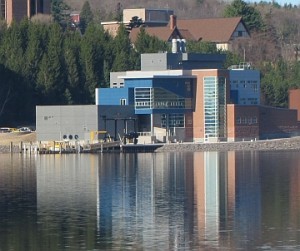 Baraga Students Explore the Great Lakes
Baraga Students Explore the Great Lakes
12 students from Baraga were on the Michigan Tech campus this week participating in a KBOCC (Keweenaw Bay Ojibwa Community College) STEM outreach-funded Great Lakes Science & Engineering Camp at the Great Lakes Research Center. The event was coordinated by Joan Chadde at the Center for Science & Environmental Outreach. The KBOCC program provides free science and math enrichment opportunities to middle and high school students in Baraga County. During the school year the KBOCC department provides after-school and Saturday workshops in music, science, math and engineering.
On campus this week the students participated in a variety of programs with Tech faculty and GLRC personnel.
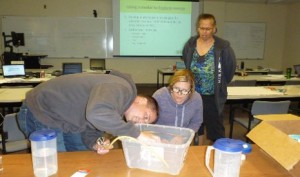 Teachers Work on New Ways to Teach Middle-School Science This Week at Three Universities
Teachers Work on New Ways to Teach Middle-School Science This Week at Three Universities
Middle-school science teachers from across Michigan are back in school themselves this week at Saginaw Valley State University (SVSU), Grand Valley State University (GVSU) and Michigan Technological University, working on a new and better way to teach middle-school science.
They are participating in the Michigan Science Teaching and Assessment Reform (Mi-STAR) program. Learning ways to connect the sciences to each other and to real-world problems, biology, chemistry, physics and earth sciences teachers are working together to create a new kind of science curriculum, one that crosses the traditional boundaries between science subjects and engineering and focuses on solving real-world science problems such as ensuring access to clean water and sustainable sources of energy.
Read more at Michigan Tech News, by Jennifer Donovan.
Learn more about teacher professional development at Michigan Tech.
Michigan Tech hosts gathering for science teachers
“We feel that it’s important for our students to be able to understand that not only science is important in the classroom, but it’s also important in your everyday life,” said Yonee Bryant-Kuiphoff, Kalamazoo science teacher.